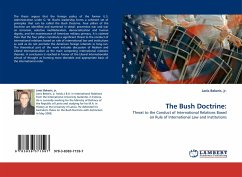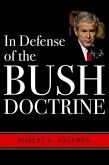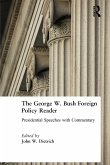The thesis argues that the foreign policy of the former U.S. Administration under G. W. Bush's leadership forms a coherent set of principles that can be called the Bush Doctrine. Four pillars of the Doctrine are identified and examined in detail: preventive war and war on terrorism, selective multilateralism, democratization and human dignity, and the maintenance of American military primacy. It is claimed then that the four pillars constitute a significant threat to the conduct of international relations based on rule of international law and institutions as well as do not promote the American foreign interests in long-run. The theoretical part of the work includes discussion of Realism and Liberal Internationalism as the main competing international relations theories. A conclusion is reached in favour of the Liberal Internationalist school of thought as forming more desirable and appropriate basis of the international order.
Bitte wählen Sie Ihr Anliegen aus.
Rechnungen
Retourenschein anfordern
Bestellstatus
Storno








